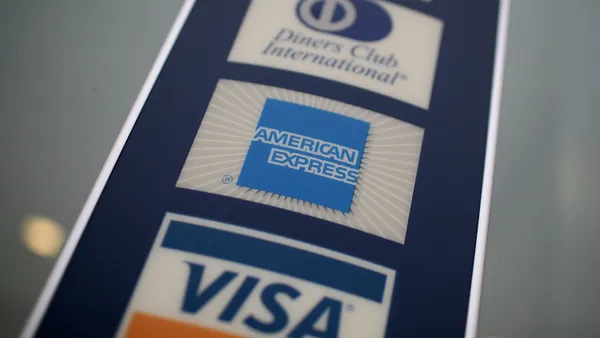Inflation could benefit credit card behemoth American Express and payment processing giant Fiserv as long as price hikes don’t get out of control, the chief financial officers for both companies said in recent presentations.
Higher prices mean more payments volume, on a dollar basis, and that results in more revenue for New York-based Amex, Chief Financial Officer Christophe Le Caillec explained at the June 11 Morgan Stanley U.S. Financials Conference. That’s because merchants pay the company interchange fees, based on the size of the transaction, whenever an American Express cardholder swipes a credit card.
“It provides a bit of support for our revenue growth, and our expenses don’t travel at the same speed,” the CFO said in a question-and-answer session.
However, if inflation runs too hot and tips the economy into a recession, that would likely mean shoppers pare back their total spending, hurting companies like American Express, Le Caillec said. But on balance, “we're in a good place, as long as inflation doesn't translate into unemployment,” he added.
Le Caillec's statement on inflation echoed comments from Fiserv Chief Financial Officer Bob Hau at the JPMorgan Global Technology, Media and Communications Conference on May 15.
“A little bit of inflation is actually a good thing,” Hau said, noting that slightly higher prices result in more payment volume for the Milwaukee-based company. But “it's got to be a little bit,” he said. “If it's too much, that has a macro impact.”
Bank of America analyst Mihir Bhatia agreed that inflation could help the bottom line for companies “as long as it is modest and doesn't affect overall [economic] activity.” “As long as it stays in check, it's good for them,” he said in an interview.
Prices may be getting a boost as a result of the White House’s new tariff policies. President Donald Trump's 10-percent, across-the-board tariffs took effect in April, with higher tariffs on certain goods such as aluminium and steel.
So far, tariffs have not supercharged inflation, as some economists feared. Annual inflation was 2.4% in April, the last month for which statistics are available, which was a lower figure than many economists had predicted.
However, prices could still rise as Trump has repeatedly threatened to impose more import duties.
Tariffs could also impact payments companies by increasing costs. Some of the card readers that Fiserv and restaurant point-of-sale provider Toast sell to retailers and restaurants, for example, are manufactured overseas and therefore subject to tariffs.
Boston-based Toast is seeing “slightly higher tariff expenses related to our hardware,” the company’s chief financial officer, Elena Gomez, said in a May 8 earnings call with investors, although she did not say where Toast’s hardware is manufactured.
Fiserv’s 2024 annual report listed tariffs as a potential pain point, noting that the company's point-of-sale devices are manufactured mostly overseas.
Spokespeople for Amex, Fiserv and Toast did not immediately respond to requests for additional comment on the impact of tariffs and inflation.












